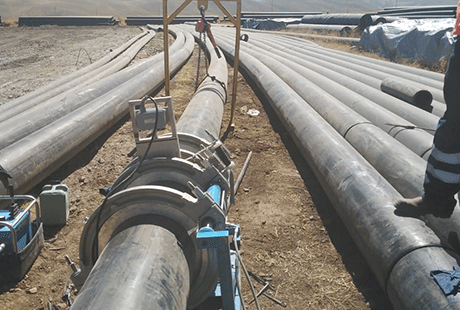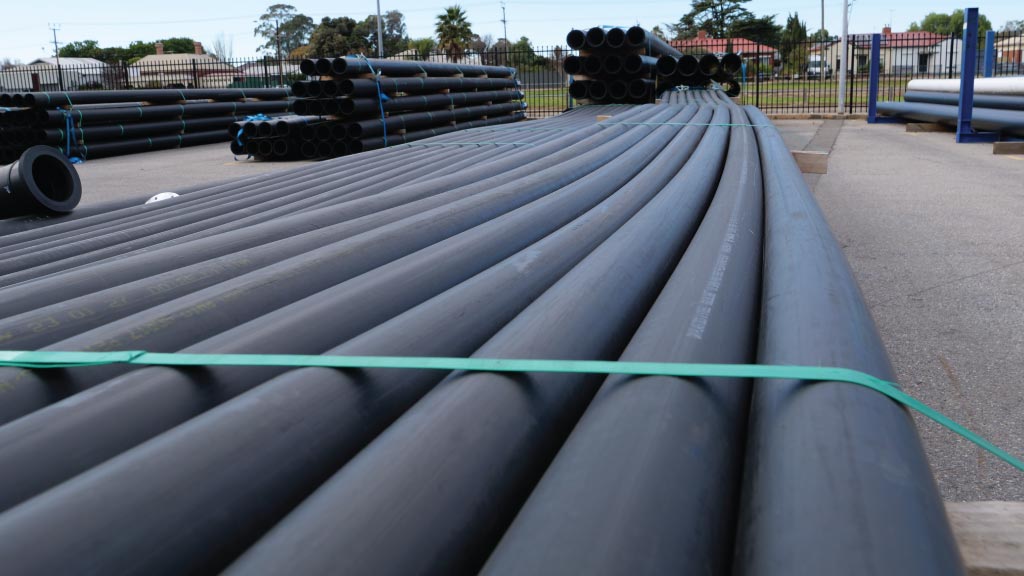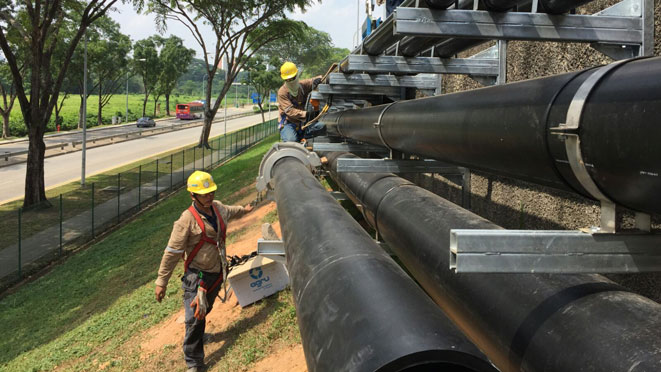Pipeline Manufacturer insights on long-term performance
Exploring the Leading Pipeline Manufacturers: Quality, Reliability, and Technology
The pipeline manufacturing industry stands at the intersection of technology, top quality, and dependability, driven by leading firms such as Tenaris and Vallourec. These makers are not just dedicated to producing high-performance products yet are additionally pioneering lasting methods that resolve modern ecological worries (Pipeline Manufacturer). As we check out the requirements that define excellence in pipeline options, it ends up being evident that the landscape is quickly progressing. What specific advancements are arising, and how are these improvements forming the future of pipeline framework? The responses might redefine industry criteria in ways that are not yet fully comprehended
Leading Manufacturers Review
In the domain name of pipeline manufacturing, several principals arise as leaders, each adding substantially to the market's landscape. Firms such as Tenaris, Vallourec, and JFE Steel have actually established themselves as frontrunners by regularly providing high-grade items that fulfill rigid sector criteria. Tenaris, renowned for its cutting-edge options, focuses on seamless and welded pipelines, catering largely to the oil and gas field. Vallourec, a French multinational, concentrates on the production of premium tubular solutions, highlighting sustainability and progressed innovation in its manufacturing procedures.
JFE Steel, a major Japanese manufacturer, is recognized for its considerable range of steel pipelines, specifically those utilized in power and infrastructure tasks. Their dedication to r & d has actually enabled them to create high-performance products that hold up against extreme ecological problems. Furthermore, firms like U.S. Steel and National Oilwell Varco have expanded their market presence by diversifying their product offerings and improving functional effectiveness.
These leading makers not only control the market but additionally drive advancement within the market, setting benchmarks for top quality and reliability that players desire attain. Their contributions are essential for meeting the increasing demand for sturdy and reliable pipeline solutions worldwide.
Criteria for High Quality Evaluation
Quality analysis in pipeline manufacturing rests on two essential criteria: material durability standards and manufacturing procedure effectiveness. Ensuring that materials fulfill strenuous resilience standards is important for the long life and reliability of pipelines. In addition, maximizing the manufacturing procedure can boost efficiency while keeping premium quality, ultimately influencing general performance and safety and security.
Product Longevity Standards
Assuring the longevity and reliability of pipeline materials is essential for keeping framework integrity and operational efficiency. Product resilience criteria play an essential role in reviewing the quality of pipes, dictating the efficiency and life expectancy of the materials utilized in building. Manufacturers should abide by a variety of extensive standards, consisting of those set by companies such as ASTM International and the American Oil Institute (API)
These criteria examine numerous elements, including rust resistance, tensile stamina, and tiredness efficiency. As an example, pipes made use of in corrosive environments need products that can hold up against chemical destruction, while those subjected to high-pressure problems need to display exceptional tensile toughness.
Furthermore, aspects such as temperature level changes and ecological conditions need to be thought about, as these can substantially influence product behavior gradually. Manufacturers typically use innovative screening methodologies, including accelerated aging examinations, to imitate long-term wear and assurance that products go beyond or satisfy market benchmarks.
Manufacturing Process Effectiveness
Manufacturers' capacity to optimize making process effectiveness is crucial for producing high-quality pipes that meet strict industry requirements. Effectiveness in making straight affects cost management, manufacturing timelines, and overall item integrity. To attain this, leading pipeline producers apply sophisticated techniques such as lean manufacturing, automation, and real-time data analytics.
Lean making principles are important in reducing waste and taking full advantage of resource use. By simplifying procedures and getting rid of redundancies, suppliers can improve productivity while ensuring regular high quality. Automation innovations, including robotics and computer mathematical control (CNC) machines, play a crucial role in boosting accuracy and reducing human mistake, thus raising the reliability of the final item.
Additionally, making use of real-time information analytics permits producers to keep an eye on production procedures constantly, allowing them to identify bottlenecks and make timely adjustments. This aggressive method not only improves efficiency however likewise sustains top quality assurance protocols by ensuring conformity with governing standards.
Integrity in Pipeline Solutions
Reliability in pipeline solutions is critical, as it straight influences the security and performance of liquid transportation systems. Trick elements consist of the sturdiness of materials utilized, adherence to strenuous testing and certification criteria, and the unification of cutting-edge material options that improve performance. Comprehending these components is crucial for suppliers aiming to provide reliable pipeline framework.
Significance of Longevity
Accomplishing durability in pipeline services is crucial, as it straight affects the lasting performance and security of framework. Sturdy pipelines are important for decreasing maintenance prices and minimizing the chance of tragic failings. This dependability is particularly vital in sectors such as oil and gas, water system, and wastewater administration, where the consequences of pipeline failing can be severe, both financially and eco.
The products and manufacturing processes employed by pipeline manufacturers play a significant role in determining the toughness of the end product. Utilizing top notch basic materials, advanced technologies, and ingenious design concepts ensures that pipes can hold up against numerous stressors, consisting of stress fluctuations, temperature variations, and corrosive atmospheres.
Moreover, the toughness of pipes is carefully connected to their ability to withstand exterior elements such as soil movement, seismic activity, and chemical direct exposures. Effective corrosion security approaches, such as layers and cathodic security, further boost the long life of pipelines, guarding them versus degeneration over time.
Buying resilient pipeline remedies eventually equates to enhanced functional effectiveness, decreased downtime, and improved security, affirming the important significance of durability in modern pipeline manufacturing.
Evaluating and Qualification Specifications
In the domain of pipeline solutions, strenuous screening and qualification standards are essential to ensure the reliability and safety and security of framework. These standards function as criteria for examining the efficiency and resilience of pipeline materials and systems, verifying they fulfill specific governing and market demands.
Evaluating processes normally include different methods, consisting of stress testing, hydrostatic analyses, and non-destructive screening techniques. These analyses are necessary for identifying possible weak points or flaws in the products before they are deployed in real-world applications. Additionally, certification by recognized organizations warranties that makers comply with developed standards, which cultivates depend on among stakeholders, including engineers, specialists, and end-users.
Numerous top pipeline manufacturers participate in continual tracking and enhancement of their screening methods to adapt to advancing sector standards and technological innovations. Compliance with requirements such as ASTM, ASME, and ISO not only boosts item integrity however additionally minimizes the threat of environmental incidents associated with pipeline failings.
Ingenious Product Solutions
The growth of cutting-edge material solutions has actually changed the landscape of pipeline manufacturing, enhancing both efficiency and durability. Advanced materials such as high-density polyethylene (HDPE), cross-linked polyethylene (PEX), and composite products have arised as game-changers, supplying remarkable resistance to deterioration, temperature variations, and stress variants. These materials not only prolong the lifespan of pipes but additionally decrease upkeep prices, making certain reliable long-lasting performance.
In addition, manufacturers are progressively adopting read this smart products that integrate sensors for real-time surveillance. This innovation permits proactive maintenance, significantly enhancing integrity by identifying leakages or structural weaknesses before they escalate right into essential failings. The integration of nanotechnology has likewise caused the growth of coverings that enhance the toughness of pipes versus abrasion and chemical exposure.
Sustainability is one more essential focus, with manufacturers discovering bio-based compounds and recyclable products that decrease environmental impact. As regulatory criteria continue to progress, the emphasis on innovative product services becomes critical in meeting stringent security and ecological requirements. Inevitably, these developments not only improve the integrity of pipeline systems however additionally add to the general performance and sustainability of power transport facilities.
Technologies in Pipeline Innovation
Technologies in pipeline innovation are changing the market by boosting effectiveness, safety and security, and ecological sustainability. Current innovations focus on wise pipeline systems that utilize sensing units and IoT innovation to keep an eye on conditions in actual time, enabling proactive maintenance and reducing the danger of failings. These systems can discover leaks, stress changes, and other anomalies, enabling quick response and decreasing environmental impact.
Furthermore, the development of innovative products, such as composite and corrosion-resistant alloys, significantly extends the life expectancy and dependability of pipelines. Pipeline Manufacturer (American Plastics LLC HDPE Pipeline Manufacturer). These materials decrease maintenance costs and enhance performance in rough environments, making them suitable for water, gas, and oil transportation
In addition, automation and robotics are playing an essential duty in pipeline construction and evaluation. Drones and robot gadgets assist in surveys and analyses of hard-to-reach areas, ensuring detailed evaluations without compromising safety and security.
Innovative layouts, such as modular pipeline systems, enable for greater versatility in installation and modification, providing to the dynamic demands of the energy market. Together, these technical advancements not just boost functional effectiveness however likewise contribute to a much more sustainable and resilient pipeline framework, leading the way for a greener future.
Study of Success
Across different industries, successful executions of innovative pipeline modern technologies show considerable improvements in functional effectiveness and safety and security. One significant case is the deployment of smart pipeline tracking systems in the oil and gas sector, where real-time data analytics have decreased leakage detection times by over 50%. This not just decreases ecological dangers yet also enhances the overall integrity of pipeline infrastructure.

In addition, a major manufacturer carried out robot assessment innovations in its pipeline maintenance procedures, causing a 40% improvement in evaluation performance. This technique has streamlined maintenance schedules and considerably decreased downtime.
These case research studies highlight exactly how leading pipeline suppliers are leveraging advanced modern technologies to cultivate integrity and operational quality, inevitably setting brand-new requirements for the industry. As these successes remain to unravel, they lead the way for additional developments in pipeline manufacturing and monitoring.

Ecological Sustainability Practices
Regularly, pipeline manufacturers are prioritizing ecological sustainability techniques to mitigate their ecological footprint and boost the durability of their products. This dedication is reflected in various efforts aimed at minimizing waste, saving energy, and making use of lasting materials throughout the manufacturing procedure.

Numerous suppliers are taking on innovative technologies that decrease exhausts and energy consumption. The assimilation of automated systems and energy-efficient equipment helps simplify manufacturing while reducing dependence on fossil gas. In addition, business are significantly transforming to environmentally friendly products, such as recycled metals and bioplastics, which not just reduce the environmental effect however likewise promote a round economic climate.
Additionally, pipeline producers are executing extensive lifecycle assessments to assess the environmental ramifications of their products from inception to disposal. This method enables them to recognize opportunities for improvement and foster responsible sourcing and waste monitoring practices.
Collaboration with environmental organizations better enhances these efforts, as suppliers seek to straighten their operations with international sustainability objectives. Ultimately, these ecological sustainability techniques not only add to a much healthier earth but also placement suppliers as responsible leaders in the sector, appealing to ecologically conscious stakeholders and consumers alike.
Future Fads in Pipeline Manufacturing
As the need for extra effective and sustainable infrastructure grows, pipeline manufacturing is positioned for significant innovations that will improve the sector. Secret trends expected in the coming years consist of the integration of innovative materials, such as corrosion-resistant and composite alloys, which enhance longevity while reducing ecological influence. Manufacturers are likewise anticipated to take on cutting-edge production techniques, like additive manufacturing and automation, to simplify processes, reduce waste, and reduced costs.
The increase of clever pipeline technologies, integrating sensors and IoT gadgets, will allow real-time monitoring and predictive upkeep, thereby boosting safety and operational performance. This electronic improvement will not only maximize source monitoring however additionally help with conformity with stringent ecological regulations.
Sustainability will certainly remain a central emphasis, driving producers to spend in green techniques, consisting of energy-efficient production techniques and recycling campaigns. As the global focus on climate change intensifies, pipeline makers will certainly need to adjust by creating remedies that meet both ecological and economic needs.
Regularly Asked Questions

What Industries Primarily Utilize Pipeline Products From These Manufacturers?
Pipeline products are primarily made use of in markets such as oil and water, gas and wastewater management, chemical mining, building and construction, and processing. These fields count on efficient, durable, and safe transportation of materials and liquids.
Exactly How Do Manufacturers Make Certain Compliance With International Pipeline Requirements?
Manufacturers assure compliance with global pipeline standards by carrying out rigorous top quality control procedures, conducting normal examinations, sticking to well established governing frameworks, and purchasing worker training to advertise understanding and understanding of safety and high quality demands.
What Is the Typical Lifespan of Pipelines From Leading Manufacturers?
The average life expectancy of pipes from leading manufacturers usually ranges from 30 to 100 years, relying on material, environmental conditions, and maintenance techniques. American Plastics LLC HDPE Pipeline Manufacturer. Regular assessments and adherence to sector standards noticeably influence durability and efficiency
Are There Certifications Details to Pipeline Production High Quality?
Yes, various certifications exist for pipeline making quality, consisting of ISO 9001 for quality administration systems and API requirements certain to pipes. These qualifications assure adherence to extensive safety, performance, and ecological requirements within the industry.
Exactly How Do Manufacturers Take Care Of Pipeline Maintenance and Services?
Manufacturers normally execute a positive maintenance strategy that includes regular assessments, monitoring systems for early discovery of issues, and an organized repair work protocol. This strategy assurances pipeline integrity, decreases downtime, and improves total functional effectiveness.
Quality analysis in pipeline manufacturing hinges on 2 essential requirements: product longevity criteria and manufacturing procedure performance - Pipeline Manufacturer. Product sturdiness criteria play an essential duty in evaluating the high quality of pipes, determining the performance and life expectancy of the products utilized in building and construction. The products and manufacturing procedures utilized by pipeline manufacturers play a significant function in establishing the resilience of the final item. The ordinary life-span of pipelines from leading producers typically varies from 30 to 100 years, depending on product, environmental problems, and maintenance methods. Yes, different certifications exist for pipeline producing high quality, including ISO 9001 for top quality monitoring systems and API requirements specific to pipes